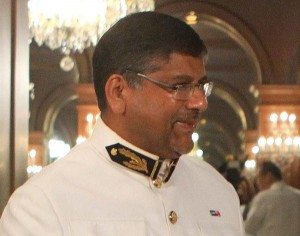New UK envoy hopes to boost trade with PH
MANILA, Philippines—The United Kingdom’s new ambassador to Manila is hoping to see an improved business climate in the Philippines, saying that reform efforts should not hamper transactions with the government in order to keep investors’ interest.
Ambassador Asif Ahmad said this in a recent interview as he laid down his plans to boost bilateral trade between Manila and London, maximizing the Philippines’ growth trajectory and Britain’s position as the country’s leading European trade partner.
“Asia—that’s where the big engine for growth is. And the Philippines (economy) of course is now growing second only to China. We have identified a number of countries—we have a special name for them—emerging powers, [being] powerful on the global stage. If we engage with you, diplomatically, economically, then our prosperity will rise in yours,” Ahmad told reporters in an interview at his residence on Wednesday.
Higher investment
He cited plans for spurring greater inbound investment into Britain—something that he accomplished while ambassador to Thailand, his last posting before his Manila assignment.
“I want to do something which has never been done before, which is to generate higher levels of investment from the Philippines into the UK. And you might look at me and think I’m crazy,” said Ahmad.
“During my time, the single biggest investment in the UK was from Thailand (in the steel sector). If Thailand can do it, I can’t see any reason why we can’t have someone from the Philippines doing it,” said the envoy.
He said he was on the verge of brokering a deal with a local Philippine business to invest in the UK, but withheld details as talks were still in progress. He revealed, however, that “it’s almost as big as the one in Thailand.”
Bilateral trade between Manila and the UK stands at nearly a billion pounds or about $1.5 billion.
‘Daang matuwid’
Giving his two-cents worth on President Aquino’s “daang matuwid” reform program, Ahmad said such effort should consider whether it would affect the ease of doing business.
“I think what has happened is that, on the one hand, there has been proper focus on transparency and corruption and getting things done the right way. But in correcting that, in some public procurement, it has gone so far the other way that there’s paralysis,” noted Ahmad.
“People are terrified of making a decision, and we need to find a place in the middle, where you do things properly but you don’t hold up everything until the last semicolon on the contract document has been checked,” said the envoy.
He noted that while business-to-business deals were fairly easy in the Philippines, it was much more challenging to do business with the government here.
“Business to business, I think it’s probably easier and better here than anywhere else in the world that I’ve come across, because you reach a decision in the Philippines as a foreigner very quickly,” Ahmad said.
“But doing business with the government here, I’d say, it feels more difficult than in other places I have encountered. Which is a question of time, but it won’t be lacking in effort. I’ll be working on this. It’s an issue of confidence,” he said.
He cited an encounter with some 50 UK firms that had previously done business in the Philippines but “walked away and they’re not interested again.”
SEE ALSO:
